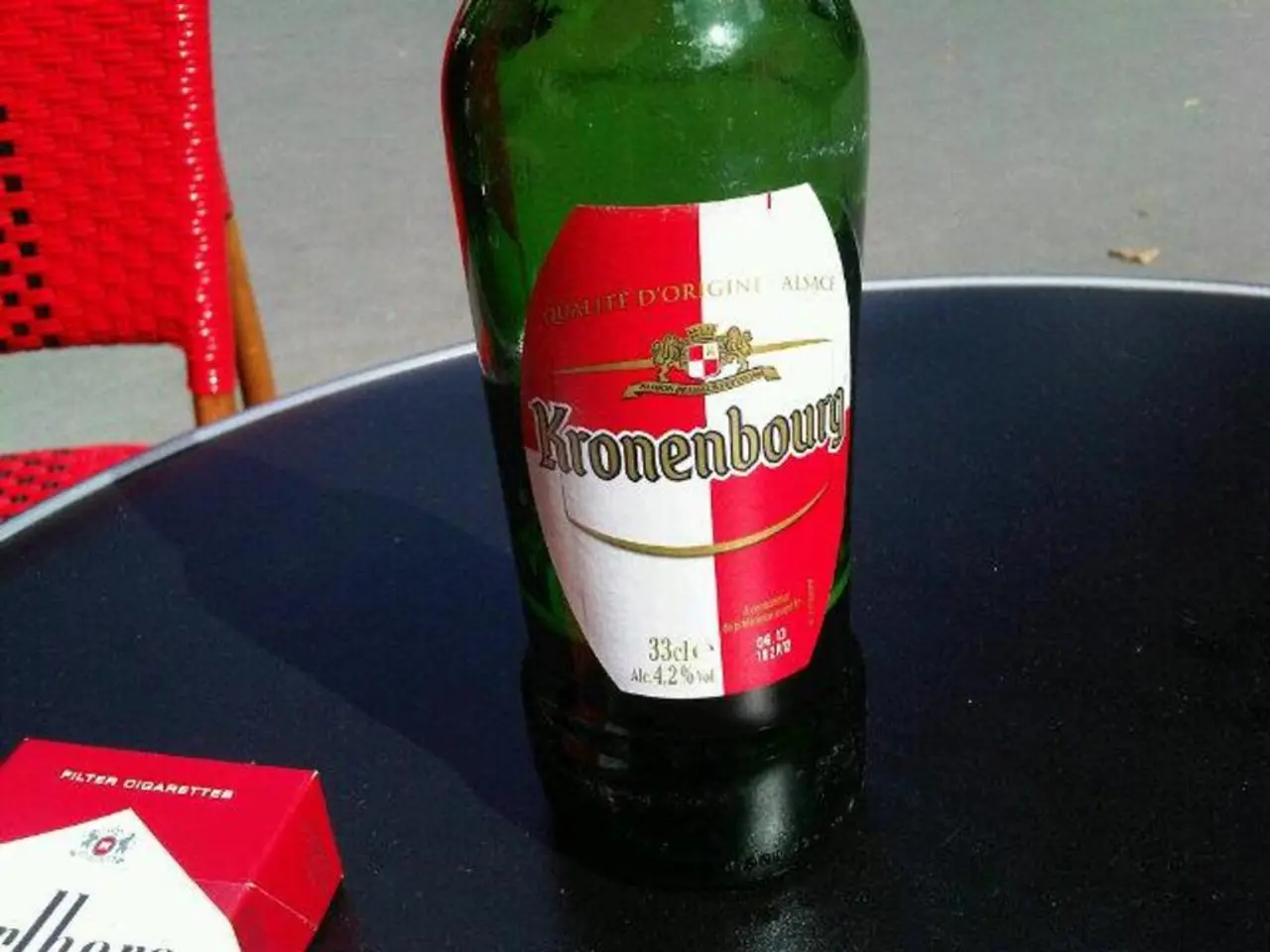Connection between Alcohol and Hypoglycemia: Symptoms, Indications, and Solutions
Alcohol consumption can have a significant impact on blood sugar levels, particularly for individuals with diabetes. This effect is due to alcohol interfering with the liver's ability to manage glucose.
When alcohol is consumed, the liver's process of producing glucose from non-carbohydrate sources, known as gluconeogenesis, is inhibited. This can lead to low blood sugar levels, or hypoglycemia, especially in people with diabetes who are using insulin or other glucose-lowering medications, especially if alcohol is consumed without food.
For people with diabetes, the risk of hypoglycemia is heightened when alcohol is consumed on an empty stomach or combined with diabetes medications. Certain alcoholic beverages, such as beer, sweet wine, and sugary mixed drinks, contain carbohydrates that can cause an immediate rise in blood glucose. In contrast, spirits with little or no carbs may have less immediate effect but can still influence insulin sensitivity when consumed in large amounts.
In the general population without diabetes, the effects of moderate alcohol intake on blood sugar levels are more complex. Some studies suggest that low-to-moderate alcohol consumption might improve insulin sensitivity and reduce the risk of developing type 2 diabetes. However, heavy or binge drinking can increase insulin resistance, making it harder for the body to regulate blood sugar, which can eventually contribute to the development of type 2 diabetes.
To manage blood sugar levels when consuming alcohol, people with diabetes should monitor their blood sugar closely, avoid drinking on an empty stomach, and seek medical advice before mixing alcohol with medication. The "15-15 rule," which advises a person to have 15 grams of carbohydrates and recheck blood sugar levels after 15 minutes, can be a useful guideline for treating hypoglycemia. However, people with diabetes whose blood sugar level is too low to treat with the 15-15 rule safely may require glucagon injections.
In summary, alcohol impairs the liver's glucose production ability, increasing the risk of hypoglycemia, especially in people with diabetes or on glucose-lowering drugs. The impact on blood sugar varies by alcohol type: sugary drinks raise blood glucose acutely, while spirits affect insulin sensitivity. Heavy drinking promotes insulin resistance and higher blood sugar, increasing the risk of diabetes over time. Moderate consumption may have some beneficial insulin sensitivity effects but should be approached with caution in those with or at risk for diabetes.
- A naive individual may not understand the significance of alcohol's impact on blood sugar levels, particularly for those with diabetes.
- The consequences of alcohol consumption on blood sugar levels can be dire, particularly due to its interference with the liver's gluconeogenesis process.
- Hypoglycemia, or low blood sugar levels, can be a risk for people with diabetes who consume alcohol, especially when done so without food.
- For people with diabetes, the combination of alcohol and certain medications can exacerbate the risk of hypoglycemia.
- Beer, sweet wine, and sugary mixed drinks are examples of alcoholic beverages that can initially cause a spike in blood glucose levels.
- In contrast, spirits with little or no carbs may not have an immediate effect on blood sugar levels but can still impact insulin sensitivity when consumed in large amounts.
- In the general population without diabetes, the effects of moderate alcohol intake on blood sugar levels are more intricate.
- Some studies propose that low-to-moderate alcohol consumption might enhance insulin sensitivity and lower the risk of type 2 diabetes.
- On the other hand, heavy or binge drinking can lead to insulin resistance, making it more difficult for the body to regulate blood sugar, potentially contributing to the onset of type 2 diabetes.
- To effectively manage blood sugar levels when consuming alcohol, people with diabetes should closely monitor their blood sugar, avoid drinking on an empty stomach, and seek medical advice concerning medication.
- The "15-15 rule," which involves a person consuming 15 grams of carbohydrates and checking blood sugar levels after 15 minutes, can be a beneficial guideline for treating hypoglycemia.
- However, individuals with diabetes whose blood sugar level is too low to treat with the 15-15 rule safely may require glucagon injections.
- Science continues to evolve our understanding of the relationship between alcohol consumption and blood sugar levels, diabetes, and overall health and wellness.
- Sleep, workplace-wellness, and mental-health are all significant aspects that can be affected by chronic diseases like diabetes and other medical conditions.
- Chronic diseases such as cancers, respiratory conditions, digestive-health issues, eye-health problems, hearing impairments, and neurological disorders require continuous attention and management.
- Skin-care, sexua-l health, autoimmune-disorders, fitness-and-exercise, nutrition, aging, womens-health, parenting, and weight-management are all critical areas of health and wellness that warrant consideration.
- Cardiovascular-health is another fundamental aspect of health that can be influenced by alcohol consumption, diabetes, and various other chronic diseases.
- Medicare plays an essential role in providing healthcare coverage for many individuals, particularly those with chronic diseases like diabetes and related conditons.
- Alternative therapies such as CBD may offer potential benefits for managing symptoms related to various chronic diseases, including diabetes and neurological disorders.
- It is vital to consider the interplay between alcohol consumption, chronic diseases, mental health, and aging when addressing overall health and wellness.
- By being informed and mindful of the potential impacts of alcohol on blood sugar levels, individuals can make proactive choices to prioritize their health and wellness.




